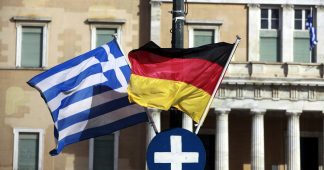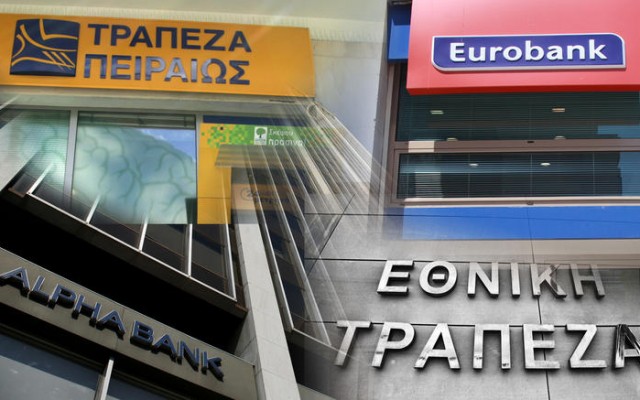by Anouk Renaud
20 July, 2018
On Friday 22 June 2018, after night-long negotiations, the Eurogroup (meeting of the finance ministers of the eurozone, along with representatives of the IMF and the ECB) announced with great fanfare / pomp and circumstances, a new agreement concerning Greece. It is supposed to be a “historic” agreement that would sound the death knell of the Greek crisis. [1] Now all the media are saying that Greece “is turning a page,” that “the Greek people can smile again,” that it marks “the end of the Greek crisis,” and that “Greece had settled its debt problem.” [2]
If we are to believe the declarations made by Eurogroup members and mainstream media, not only will this agreement permit Greece to get back on its feet, but in addition, its clauses are said to be rather exceptional for the Eurogroup, which resigned itself to making a true “gesture.”
Yet, if we look a bit closer, this agreement is very much like the previous ones and the policies imposed on Greece up until today, which means that it protects the interests of Greece’s creditors to the detriment of the Greek people.
Disbursement of the final tranche of the third aid package to pay back the debt
Since the first of the “bailout plans,” the Eurogroup has only delivered loan money by tranches, as a guarantee that austerity measures could be put in place in exchange. “No austerity, no aid” is the principle now inherent in any intervention by European and international financial institutions. Here, to benefit from this final tranche, Tsipras committed to the implementation of 88 additional neoliberal measures that flout the interests of the Greek people. Accordingly, just as the Eurogroup was bragging about the end of the Greek crisis, Greek unions took to the streets of Athens to protest against the immediate layoff of 12,000 workers with a fixed-term contract in hospitals and health establishments.
How is the money paid as part of the third loan agreement going to be used? Exactly as had been the case in the previous “aid” packages: to pay down public debt. As the Eurogroup has stated, of the €15 billion in this final tranche, €5.5 billion will be deposited on a specific account earmarked for servicing its debt. The remaining €9.5 billion will be placed on another special account of liquidity reserves that can be used if needed… for the future servicing of its debt. European leaders claim that these reserves will make it possible to win over the confidence of the financial markets and benefit from a sustainable interest rate for financing its economy. In reality, it is a guarantee for future private creditors who are assured they will be paid back. It comes as no big surprise, because the leitmotiv of these Institutions since the beginning of the Greek crisis has been to do everything to make Greece continue to pay back its debt, first of all to private financial establishments.
It is also worth noting that of the €86 billion in the initial “bailout” package, €25 billion were not disbursed to Greece. Nor were the amounts of the loans scheduled and announced in 2010 and 2012 completely given, but that did not result in any reactions from editorialists or politicians.
A fiscal surplus of 3.5%: the iron cage of austerity
This new agreement stipulates that Greece must achieve a yearly fiscal surplus [3] of 3.5% until 2022, and then comply with European criteria (an average surplus of 2.2% between 2023 and 2060). But today the countries that succeed in achieving such results can be counted on one hand. Obviously, these criteria are not made to be respected, but to thwart political decisions that would not be in line with a massive reduction of public spending. Imposing such a target on Greece – in the guise of rational figures – is synonymous with condemning it to implementing policies that will continuously reduce social spending social spending and public investments. For, if Greece manages to make a significant fiscal surplus, it is precisely because the missions entrusted to the State have been increasingly eroded and its obligations to Greek citizens increasingly neglected.
Retroceding the profits made at the expense of Greece
The Eurogroup has finally committed to retroceding to Greece the profits rolled up abusively via the bond buyback operations conducted by the ECB and the central banks of the eurozone. We should recall that from 2012 to 2016 alone, the ECB chalked up €7.8 billion in profits thanks to Greek bonds. [4] In November 2012, the Eurogroup had made a commitment to return these odious profits to Greece, because it is ultimately the EU member states that benefit from it when it is redistributed by the ECB. However, they stopped returning these odious profits to Greece after the Syriza I government came into power. In any case, we should not be deceived by the Eurogroup’s commitment to resume these retrocessions.
First, the retrocession of the odious profits will not be resumed until 2018, i.e. based on the profits rolled up in 2017. What about the profits made by the member states in 2015 and 2016? They will never be returned to Greece. For example, as far as France is concerned, this represents €758.1 million that will remain in the French coffers. [5] Second, these retrocessions will always come with conditions. The creditors have indeed retained this means of putting pressure on the Greek government in case it attempts to call into question the austerity reforms. Already in November 2012, the Eurogroup’s commitment to paying back the profits racked up came with the condition that austerity measures would be applied. [6]
Finally, and as was the case for the first retrocessions made in 2013 on a special account earmarked for paying down the debt, Greece will not be able to use this money, which is owed to it, as it sees fit. Indeed, by saying this money will be used to reduce its gross financing needs, the Eurogroup says nothing more than that it will be devoted to servicing its debt.
Of course, this same Eurogroup has little to say about the colossal profits racked up by creditors on the backs of the Greek people. Since 2010, the IMF has reaped some €5 billion in profits via the loans given to Greece. [7] Meanwhile, Germany, a hardliner in the Eurogroup, rolled up some not too shabby profits amounting to €2.9 billion [8] from the Greek crisis.
Cosmetic debt relief measures
One central point highlighted in the agreement made with Greece concerns a 10-year grace period (with no payment of interest or capital) on ESM and EFSF loans, as the maturity date for these loans was postponed by 10 years. Greece should therefore start paying them back in 2032 instead of 2022.
But here again, there is no reason to jump for joy [because of their new features or generosity]. As is usually the case in the debt relief processes led by creditors, it is just a question of giving a bit of air to the debtor so that it does not drown to death, but instead continues paying back its creditors (in this case, so Greece can return to the markets to finance its debt). And, of course, if it still needs repeating, this “relief” comes with the condition of new austerity measures.
As the root cause of the debt problem has not been addressed – today the Greek debt stands at 180% of the nation’s GDP – the question of its unsustainability will be back on the table much sooner than the Eurogroup wants to make us believe, even the IMF has concerns about the long-term sustainability of the Greek debt”. [9] What is perhaps even more important is that the repayment of this debt is never called into question, but considered to be self-evident. Yet the debt being paid off today by Greece is illegitimate, odious and illegal, as has been established by the Truth Committee on Greek Debt [10] set up in April 2015 by the former president of the Greek Parliament. The Troika’s loans to Greece were granted to save the European banks, and today the country is paying back this debt while jeopardizing the lives of Greek citizens. The shift for repayment from 2022 to 2032 does not change anything in people’s lives.
Tutelage that no longer goes by that name
With this agreement, the partners in the “quartet” (ECB, European Commission, IMF and ESM) have kept their quarters in Athens. Although we no longer speak of “reviews,” during which the senior officials of these institutions come to evaluate and re-write the decisions made by the Greek government, the mechanism remains in place.
From now on, the Greek accounts will be audited every quarter by the quartet, and if Greece were to not apply or call into question any of the measures stated in the different memoranda, part of the relief measures would be suspended. To cite just one example, the creditors insist that it is fundamental to continue the privatization programme. This programme includes the sale of Greece’s majority share in a public natural gas company scheduled for November, [11] after the official end of the European programme. The Eurogroup reserves the right to redefine, set an upper limit to and defer interest payments to the EFSF as much as it deems necessary. The so-called relief measures, however insignificant they may well be, could very quickly prove to be obsolete.
The meddling of European Institutions in Greek affairs is far from over. Proof of this can be seen in declarations made by the Eurogroup, which are supported by Tsipras himself, in favour of overturning the sentence of Andreas Georgiou. The former Director of the ELSTAT, the Hellenic Statistical Authority, was given a two year suspended prison sentence by the Greek courts for having deliberately falsified the Greek public debt figures in 2010. [12]
This agreement is nothing exceptional, and does not settle anything at all. It simply allows the creditors to keep Greece in chains, without moving on to a veritable fourth “bailout” plan, which would have been difficult to justify to Europeans at large and Greeks in particular. Once again, the Eurogroup has redecorated the public debt cage in which Greece has been locked up for years. The only thing left for the Greek people to do is to break the bars of their cell.
To learn more about the Greek crisis, the bailout plans, where this money is going, the austerity measures imposed, and the creditors of Greece, see the video series « À qui profite la dette grecque ? » : https://www.youtube.com/watch?v=_ccIEvsjUT8 (in French).
Many thanks to Éva Betavatzi, Yvette Krolikowski and Éric Toussaint for their precious input.
Translated by Charles La Via and Christine Pagnoulle.
Footnotes
[1] “The Greek crisis ends here tonight. We finally got to the end of this path which was so long and difficult. It is a historic moment.” http://www.france24.com/en/20180622-greece-financial-crisis-over-eurozone-agrees-debt-relief-plan-bailout, 22 June 2018.
[2] Various statements by Greek officials as reported in The Guardian Friday 22 June 2018, https://www.theguardian.com/world/2018/jun/22/eurozone-greece-financial-crisis-deal. /
See for instance: AFP, « Après huit ans, la crise de la dette grecque « s’achève » », 22 June 2018 / Sophie Leroy, « Grèce : une page se tourne, c’est la fin de la crise », L’Echo, 22 June 2018.
[3] A fiscal surplus means that a country’s revenues exceed its expenditures, but does not include debt servicing.
[4] ECB, “Letter from the ECB President to Mr Nikolaos Chountis (Q2064), MEP, on the Greek adjustment programme,” October 2017. Can be read at: https://www.ecb.europa.eu/pub/pdf/other/ecb.mepletter171010_Chountis.en.pdf?ca00752c61bdb4df6c227f4f3c62b98a
To learn more about the profits made through bond buyback operations, see Eric Toussaint, “ECB’s odious profits on the backs of the Greek people”, CADTM, October 2017. Can be read at: http://www.cadtm.org/ECB-s-odious-profits-on-the-backs
[5] French Court of Auditors, « Compte d’affectation spéciale. Participation de la France au désendettement de la Grèce. Note d’analyse de l’exécution budgétaire », 2016. Can be read at: https://www.ccomptes.fr/sites/default/files/EzPublish/NEB-2016-Participations-France-desendettement-Grece.pdf
[6] Eurogroup, “Eurogroup statement on Greece,” November 2012. Can be read at: http://www.realinstitutoelcano.org/wps/wcm/connect/f4261d004d9b58f38073c27bf08704f4/Eurogroup_Statement_Greece_27november2012.pdf?MOD=AJPERES&CACHEID =f4261d004d9b58f38073c27bf08704f4
[7] Or nearly 4 billion special drawing rights, the unit used by the IMF. See: “International Monetary Fund, Greece: transactions with the Fund from May 1984 to May 2018.” Can be viewed at: http://www.imf.org/external/np/fin/tad/extrans1.aspx?memberKey1=360&endDate=2099%2D12%2D31&finposition_flag=YES
[8] Spiegel, “Deutschland macht 2,9 Milliarden Euro Gewinn mit Griechenland-Hilfe,” 21 June 2018. Can be read at: http://www.spiegel.de/wirtschaft/soziales/griechenland-hilfe-deutschland-macht-2-9-milliarden-euro-gewinn-a-1214134.html
[9] See for instance https://www.theguardian.com/world/2018/jun/22/eurozone-greece-financial-crisis-deal.
[10] Truth Committee on Greek Debt, Preliminary Report, CADTM, June 2015. Can be read at: http://www.cadtm.org/Preliminary-Report-of-the-Truth
[11] Angeliki Koutantou and Catherine Mallebay-Vacqueur, « Grèce : la privatisation de Depa débutera en novembre », Reuters, 18 June 2018. Can be read at:
https://fr.reuters.com/article/businessNews/idFRKBN1JE241-OFRBS
[12] For further information, see: Constantin Kaïmakis, « Grèce : le procès Gergiou ou l’affaire de la falsification des statistiques grecques pour justifier l’intervention de la Troïka », CADTM, June 2018. Can be read at: http://www.cadtm.org/Grece-le-proces-Georgiou-ou-l-affaire-de-la-falsification-des-statistiques (in French only).
Published at http://www.cadtm.org/Greece-still-under-the-yoke-of-its-illegitimate-debt











